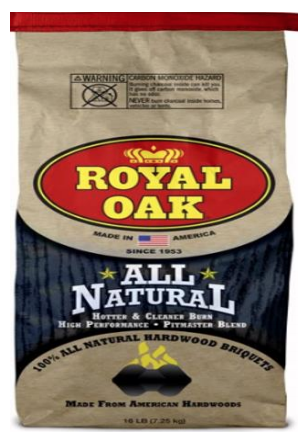‘Mislabeled and Misbranded’: Class Action Alleges Royal Oak Enterprises Falsely Advertises Charcoal as ‘100% Natural Hardwood’
Lyons v. Royal Oak Enterprises, LLC
Filed: January 22, 2021 ◆§ 7:21-cv-00524
A class action claims Royal Oak has falsely and misleadingly represented its "100% Natural Hardwood" charcoal as eco-friendly and superior to other brands, among other claims.
New York
A proposed class action alleges Royal Oak Enterprises, LLC has “falsely and misleadingly” represented its charcoal as 100-percent natural hardwood, eco-friendly and superior, in part by claiming the product burns “hotter, cleaner and starts faster.”
 The 20-page false advertising lawsuit out of New York alleges Royal Oak has, in truth, “jumped on the bandwagon” of consumer demand for natural, healthy and environmentally friendly products by misrepresenting the properties and composition of its charcoal.
The 20-page false advertising lawsuit out of New York alleges Royal Oak has, in truth, “jumped on the bandwagon” of consumer demand for natural, healthy and environmentally friendly products by misrepresenting the properties and composition of its charcoal.
“Unbeknownst to novices, people who occasionally barbeque and even many aficionados, Defendant’s Product contains numerous chemicals that have an adverse effect on health,” the complaint alleges. “Furthermore, Defendant’s product is not made with 100% wood material as they portray it to be. Nor can the Product be described as ‘clean,’ or ‘cleaner.’”
According to the lawsuit, Royal Oak’s claim as to the “100-percent natural” composition of its charcoal is “an attempt to deceive” consumers into believing the product is made of 100-percent natural hardwood. Per the suit, Royal Oak’s use of the non-English word “briquet” furthers this misrepresentation in that a charcoal “briquette” is defined as a small block of compressed coal dust or charcoal used for fuel.
In truth, the composition of the defendant’s supposed 100-percent natural hardwood charcoal includes coal, limestone, borax, nitrates and wood scraps, the lawsuit claims.
The suit goes on to state that conventional charcoal briquettes suitable for barbecuing are typically comprised of roughly 40 percent by weight of charcoal, 20 percent limestone, 10 percent starch and 30 percent of either lignite or anthracite coal. Per the case, barbecue charcoal might also include around two percent of nitrate as an oxidizer and roughly 0.5 percent of borax as a slicking agent.
“Therefore, Defendant’s claim that the product is ‘100% All Natural Hardwood’ is false and misleading,” the lawsuit says. “The Product is mislabeled and misbranded.”
Further, the suit contends that Royal Oak’s “100% All Natural Hardwood” claim “has no place in charcoal promotion,” and is more fitting in advertising food products.
Royal Oak’s eco-friendly and health-based claims, in particular that its charcoal burns cleaner, “cannot be sustained” given the amount of carbon dioxide released per hour of cooking, the lawsuit goes on. Whereas propane gas is considered the cleanest fuel source for barbecues, releasing about 5.3 pounds of carbon dioxide per hour, charcoal emits “about 11 pounds of carbon dioxide” into the air per hour of cooking, according to the suit.
Moreover, lump charcoal, which is comprised of pieces of wood burnt in a kiln, also emits less carbon dioxide than the defendant’s charcoal briquettes, the complaint says, adding that cooking with propane is “also considered healthier” than using charcoal.
“The charcoal cooked food contains more carcinogens because the charcoal emits more smoke and the flames are hotter than the propane gas fueled barbeque,” the suit states. “The increase in smoke and hotter flames tend to char foods during the cooking process. In sum, Defendant’s cleaner burn claim is false, misleading and unsubstantiated.”
Despite Royal Oak’s apparent misbranding and mislabeling of its “100% Natural Hardwood” charcoal, the company does market mesquite and hickory charcoal products that are not represented as “eco-friendly” or superior to competing charcoals, the lawsuit says.
The lawsuit looks to represent all consumers in the United States and its territories who bought one or more of Royal Oak’s “100% All Natural Hardwood” charcoal products.
Get class action lawsuit news sent to your inbox – sign up for ClassAction.org’s newsletter here.
Video Game Addiction Lawsuits
If your child suffers from video game addiction — including Fortnite addiction or Roblox addiction — you may be able to take legal action. Gamers 18 to 22 may also qualify.
Learn more:Video Game Addiction Lawsuit
Depo-Provera Lawsuits
Anyone who received Depo-Provera or Depo-Provera SubQ injections and has been diagnosed with meningioma, a type of brain tumor, may be able to take legal action.
Read more: Depo-Provera Lawsuit
How Do I Join a Class Action Lawsuit?
Did you know there's usually nothing you need to do to join, sign up for, or add your name to new class action lawsuits when they're initially filed?
Read more here: How Do I Join a Class Action Lawsuit?
Stay Current
Sign Up For
Our Newsletter
New cases and investigations, settlement deadlines, and news straight to your inbox.
Before commenting, please review our comment policy.